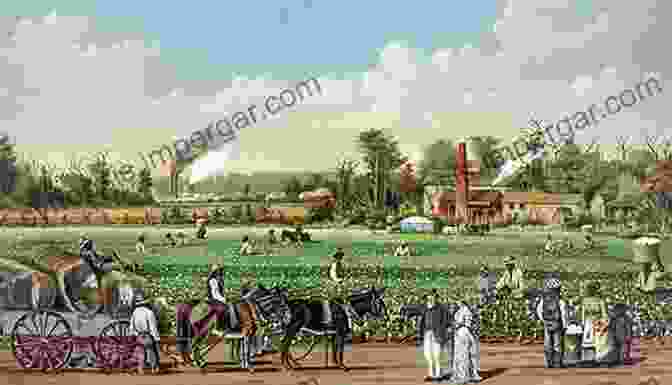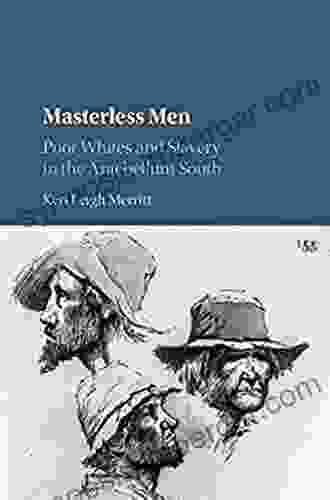Poor Whites and Slavery in the Antebellum South: Exploring the Hidden Dynamics

An In-Depth Examination of Class, Race, and the Peculiar Institution
In the annals of American history, the institution of slavery and its impact on race relations have been extensively documented. However, the role of poor whites in shaping this deeply entrenched system has often been relegated to the shadows. Poor Whites and Slavery in the Antebellum South, a compelling work by historian Edward E. Baptist, sheds new light on this marginalized group, revealing their complex and contradictory involvement in a system that simultaneously oppressed and empowered them.
4.7 out of 5
| Language | : | English |
| File size | : | 1440 KB |
| Text-to-Speech | : | Enabled |
| Screen Reader | : | Supported |
| Enhanced typesetting | : | Enabled |
| Word Wise | : | Enabled |
| Print length | : | 372 pages |
| X-Ray for textbooks | : | Enabled |
The Paradoxical Position of Poor Whites

Poor whites, a diverse group ranging from small farmers to landless laborers, occupied a unique and paradoxical position in the antebellum South. While they were often excluded from the economic and social privileges enjoyed by their wealthier counterparts, they were also complicit in maintaining the institution of slavery. Baptist argues that poor whites' proximity to slaves and their dependence on the slave economy created a complex web of relationships that shaped their own experiences and identities.
On the one hand, poor whites often harbored resentment towards wealthy planters, who wielded significant power and influence. They competed for land, resources, and jobs, creating tensions that erupted in occasional conflicts. On the other hand, poor whites also saw themselves as superior to slaves, perpetuating the racial hierarchy that sustained the slave system. This sense of superiority provided them with a degree of status and privilege, albeit precarious and limited.
Economic Dependence and Racial Solidarity
Baptist delves into the intricate economic dynamics that bound poor whites to slavery. Many poor whites relied on the slave economy for their livelihoods. They worked as overseers on plantations, rented land from slaveholders, or provided goods and services to the enslaved population. This economic dependence created a vested interest in maintaining the status quo.
Moreover, Baptist argues that poor whites' racial solidarity with slaveholders played a crucial role in preserving the institution of slavery. Despite their economic grievances, poor whites often identified with the planter class on the basis of race. They shared a common fear of slave revolts and believed that protecting the slave system was essential to preserving white supremacy.
The Violence of Class and Race
Baptist exposes the brutal violence that permeated the interactions between poor whites and enslaved people. Poor whites often served as the enforcers of slavery, carrying out whippings, beatings, and other forms of punishment. This violence served not only to control the enslaved population but also to reinforce the social hierarchy and maintain white supremacy.
However, Baptist also acknowledges that poor whites were not immune to violence themselves. They often faced economic exploitation and physical abuse at the hands of slaveholders. This violence created a cycle of brutality and resentment that further entrenched the social divisions of the antebellum South.
Identity and Agency in a Racist Society
Poor Whites and Slavery in the Antebellum South not only examines the external dynamics of class and race but also delves into the complex inner lives of poor whites. Baptist explores how they forged their identities and agency within a deeply racist society that simultaneously marginalized and empowered them.
Poor whites developed a distinct culture and set of values that reflected their precarious position in society. They embraced a rugged individualism, valuing independence and self-reliance. However, they also struggled with feelings of inadequacy and inferiority, which they often compensated for through displays of masculinity and racial superiority.
A Watershed Moment in Historical Scholarship
Edward E. Baptist's Poor Whites and Slavery in the Antebellum South is a groundbreaking work that has reshaped our understanding of race relations in the American South. By bringing the experiences of poor whites to the forefront, Baptist challenges traditional narratives that have focused primarily on the experiences of wealthy planters and enslaved people.
This comprehensive historical account is meticulously researched and written with clarity and nuance. Baptist's thoughtful analysis and vivid prose make this book accessible to both scholars and general readers alike. It is a must-read for anyone seeking to gain a deeper understanding of one of the most complex and enduring social institutions in American history.
Call to Action
Poor Whites and Slavery in the Antebellum South is an essential addition to your bookshelf if you are interested in:
- American history
- Slavery and race relations
- Class dynamics and social inequality
- The history of the American South
- The complex interplay of identity, power, and oppression
Don't miss out on this groundbreaking work that sheds new light on a pivotal chapter in American history. Free Download your copy of Poor Whites and Slavery in the Antebellum South today and embark on a journey of discovery that will deepen your understanding of the American past and its lasting legacies.
Available at major bookstores and online retailers.
4.7 out of 5
| Language | : | English |
| File size | : | 1440 KB |
| Text-to-Speech | : | Enabled |
| Screen Reader | : | Supported |
| Enhanced typesetting | : | Enabled |
| Word Wise | : | Enabled |
| Print length | : | 372 pages |
| X-Ray for textbooks | : | Enabled |
Do you want to contribute by writing guest posts on this blog?
Please contact us and send us a resume of previous articles that you have written.
 Book
Book Novel
Novel Page
Page Chapter
Chapter Text
Text Story
Story Genre
Genre Reader
Reader Library
Library Paperback
Paperback E-book
E-book Magazine
Magazine Newspaper
Newspaper Paragraph
Paragraph Sentence
Sentence Bookmark
Bookmark Shelf
Shelf Glossary
Glossary Bibliography
Bibliography Foreword
Foreword Preface
Preface Synopsis
Synopsis Annotation
Annotation Footnote
Footnote Manuscript
Manuscript Scroll
Scroll Codex
Codex Tome
Tome Bestseller
Bestseller Classics
Classics Library card
Library card Narrative
Narrative Biography
Biography Autobiography
Autobiography Memoir
Memoir Reference
Reference Encyclopedia
Encyclopedia Diane Ravitch
Diane Ravitch Debra Aiden
Debra Aiden David R Begun
David R Begun Javier Rhoden
Javier Rhoden Samuel Hack
Samuel Hack Thomas Frederick Howard
Thomas Frederick Howard Sivajith P R
Sivajith P R Devin Hunter
Devin Hunter Yusuke Ohta
Yusuke Ohta Delaney Ruston
Delaney Ruston David M Shaw
David M Shaw Yahtzee Score Pad Print
Yahtzee Score Pad Print David V Williams
David V Williams Debra K Fileta
Debra K Fileta David Rowland
David Rowland David S Nasca
David S Nasca Dennis Carl Rasmussen
Dennis Carl Rasmussen Nicole Braddock Bromley
Nicole Braddock Bromley David The Good
David The Good Mark W Cornwall
Mark W Cornwall
Light bulbAdvertise smarter! Our strategic ad space ensures maximum exposure. Reserve your spot today!

 Simon MitchellDelphi's Complete Works of Velleius Paterculus: Uncovering the Rich Tapestry...
Simon MitchellDelphi's Complete Works of Velleius Paterculus: Uncovering the Rich Tapestry... Nick TurnerFollow ·10.3k
Nick TurnerFollow ·10.3k George Bernard ShawFollow ·8.2k
George Bernard ShawFollow ·8.2k Dan HendersonFollow ·12.5k
Dan HendersonFollow ·12.5k Liam WardFollow ·16.6k
Liam WardFollow ·16.6k Jimmy ButlerFollow ·6.8k
Jimmy ButlerFollow ·6.8k Carson BlairFollow ·7.6k
Carson BlairFollow ·7.6k Anthony BurgessFollow ·19.7k
Anthony BurgessFollow ·19.7k Angelo WardFollow ·14.2k
Angelo WardFollow ·14.2k

 Ivan Turgenev
Ivan Turgenev38 Art Made During The Pandemic Digitally Enhanced Art...
By [Author's Name] The year 2024 was a time...

 F. Scott Fitzgerald
F. Scott FitzgeraldAmazing Cooking Guide To South Beach Diet: Your Culinary...
Embark on a...

 Zachary Cox
Zachary CoxGeneral History of Chinese Film: A Journey Through Time...
Origins and...

 Cristian Cox
Cristian CoxUnderstanding Antidepressants: An In-Depth Guide to...
Unleashing the Power of...

 Jeremy Cook
Jeremy CookUnlock the NFT Revolution: A Comprehensive Guide for...
The world of Non-Fungible Tokens (NFTs) has...

 Kevin Turner
Kevin TurnerSeneca and Roman Slavery Under Nero's Rule: An In-Depth...
During the reign of...
4.7 out of 5
| Language | : | English |
| File size | : | 1440 KB |
| Text-to-Speech | : | Enabled |
| Screen Reader | : | Supported |
| Enhanced typesetting | : | Enabled |
| Word Wise | : | Enabled |
| Print length | : | 372 pages |
| X-Ray for textbooks | : | Enabled |










